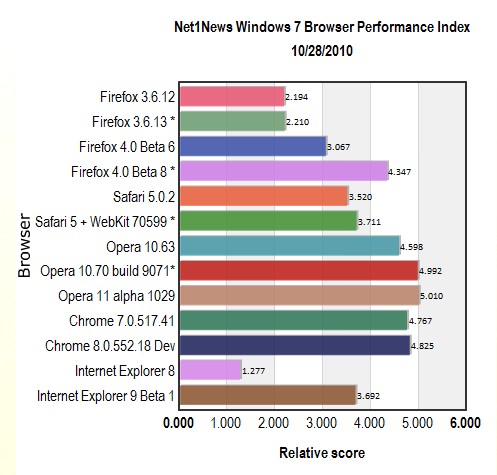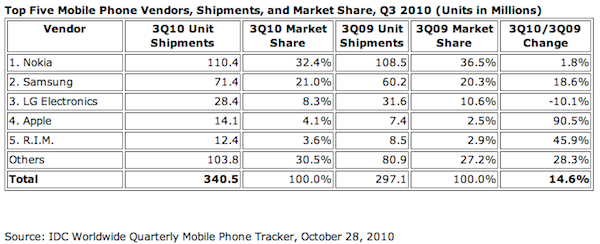By Scott M. Fulton, III, Net1News
It should have been a week of relatively good news for the Mozilla organization. The former senior vice president for mobility at enterprise database producer Sybase, Gary Kovacs, signed on to become Mozilla's new CEO next month, replacing John Lilly and serving under Foundation chairperson Mitchell Baker. Having headed up Sybase's mobility and integration efforts during that company's buyout by European software giant SAP last summer, Kovacs is certain to inject a much-needed dose of corporate prestige and structure in to the organization.
But immediately, Kovacs may find himself leading Mozilla's greatest uphill charge in its short history. Its premier product, the Firefox browser, is in the midst of a development cycle that has put it behind all its competitors - including, for the first time, Microsoft - in relative performance. This week, however, the Firefox 4 private betas were making headway, beating both Internet Explorer 9 and Apple Safari/WebKit performance scores, on the way to catching up with Google Chrome and the first alpha builds of Opera 11.
That road back will apparently be longer than recently planned. . . though actually about as long as originally planned. Last May, Mozilla planners took the bold step of cancelling Firefox 3.7 in order to concentrate on Firefox 4, a more streamlined build that provided a more aggressive and customizable platform for extensions - which may begin to be called "Firefox apps." At that time, the new point release planned for 2011 was moved within the 2010 window, with a promise to complete an aggressive and expedited round of betas in October.
As the abundance of Halloween decorations indicates, October is nearly over. For Firefox 4 to meet its development milestones and proceed to the next stage, following Mozilla's best practices, the current builds must report fewer crashes. . . and they're not. Since every aspect of Mozilla development is open source, even the field statistics gathered by the organization in real-time, are open to the public. Unlike the case with stable Firefox builds, beta builds in the field typically have fewer extensions and add-ons. . . so Adobe Flash or Adobe Reader can't be blamed for Firefox's tumbling, like in the past. With the code for Firefox 4 Beta 8 still under development, and Beta 7 in the can, Mozilla can't move out of the public Beta 6 stage until Beta 6 reports fewer than 3 crashes per test user, and until Beta 8 reports fewer than 5 per user.
"Development on Firefox 4 has not slowed down and strong progress is being made daily," product manager Mike Beltzner reported in a post to the organization's planning group Wednesday afternoon. "However, based on the delays in completing the 'feature complete' Beta 7 milestone against which our add-on developers and third-party software developers can develop, as well as considering the amount of work remaining to prepare Firefox 4 for final release, we have revised our beta and release candidate schedule."
Mozilla's recently updated itinerary indicates the schedule that developers had been working under up to this week, which already wasn't anywhere close to Beltzner's projections from last May. An unprecedented public Beta 10 had been scheduled for the second week of December. Now, there's a big blank in the column for when that cycle is expected to begin. And as far as the final product release is concerned, Beltzner is refraining from committing to a window even as wide as Q1 2010.
"Our estimate is now that release candidate builds will ship in early 2011, with a final release date close behind," he wrote Wednesday. "Please note that, as always, this schedule is subject to change based on feedback from users and community members."
Firefox 4 has actually made tremendous strides in the performance department, as it had to do in order to stay competitive in this fierce environment. Public Beta 6 posts a performance score on the Net1News index of 3.067, representing about three times the overall performance of the 2008 model of Firefox 3.0.19. Meanwhile, "private" Beta 8 (still publicly downloadable) posts a 4.347 score overall, with much of those gains on the strength of Firefox's graphics. The new edition will co-opt the graphics processor for rendering graphics; and Beta 8 now not only co-opts the GPU for rendering on the HTML 5 Canvas element, but also clearly ordinary HTML 4 rendering as well. In Net1News tests today, the latest nightly build of Beta 8 reduced CPU utilization in rendering 25 moving objects in plain HTML from a total of 13.44% (where 100% is full utilization) to 0.29%.

Click the chart above for a complete categorical breakdown.
Google Chrome also co-opts the GPU for graphics rendering (at least, that's what Google claims) but its efficiency is nowhere near that of Firefox 4 Beta 8. Although in that same test, the latest dev build of Chrome 8 was faster (1.758 relative to Firefox 3, versus 1.321), its average CPU utilization totaled 13.22%.
But some problems have also become evident in Beta 8, the resolution of which could improve Firefox's scores even more: In the SlickSpeed test, for example, Beta 8 fails to execute the CSS selector instructions in version 2.8 of the DOMAssistant library; Beta 8's scores for other libraries are actually fair, and no other browser failed to run that library.
In the comprehensive results, the alpha build of Opera 11 (Opera software thankfully isn't calling this a "pre-alpha" like last year) remains the overall leader with a 5.010 score. That lead is built mainly on the strengths of Opera's "pre-digesting" ability for re-usable code segments, which is strongly evident in its overwhelming SlickSpeed test scores: 18.574 versus 8.267 for the latest Chrome 8 dev build, and 8.562 for the stable Chrome 7. The strengths and weaknesses of all brands are now quite apparent: Firefox 4 Beta 8 is posting much faster computational scores than even Beta 6, though Chrome is by far the fastest browser computationally. (The Net1News test suite does not contain Google's V8 computational test battery, where Chrome posts frankly ridiculously better numbers than most any other browser.) Opera has the lead in rendering speed and performance, but now, Firefox 4 Beta 8 has the highest efficiency scores by virtue of its successful GPU co-opting experiment.
The browser that is now eating the dust that Firefox was eating two weeks ago, is Apple Safari hosting the dev build of WebKit. With an overall score of 3.711, WebKit just barely beats the IE9 public beta, and had been behind IE9 in previous weeks.
This article originally appeared in Net1News.
©Copyright 2010 Ingenus, LLC.
©Copyright 2010 BetaNews, Inc.
Copyright Betanews, Inc. 2010
























